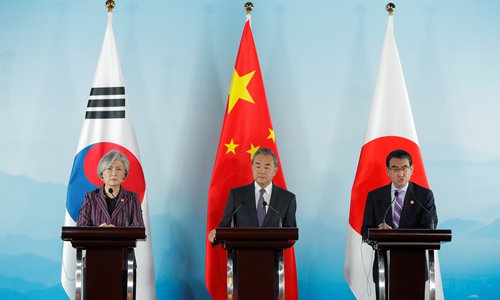HOME >> OPINION
Regional security depends on China-US ties
Source:Global Times Published: 2019/10/31 18:38:41

Chinese Foreign Minister Wang Yi (C), South Korean Foreign Minister Kang Kyung-wha (L) and Japanese Foreign Minister Taro Kono (R) attend a press conference after the ninth trilateral foreign ministers' meeting among China, South Korea and Japan at Gubei Town in Beijing, China, on August 21. Photo: VCG
Whenever a new president assumes office in South Korea, there is a debate in South Korean government over the priority of its foreign policy - should the country strengthen its alliance with the US or should it improve its relations with North Korea? A conservative government tends to pick the first option while a progressive government, like the administration led by President Moon Jae-in, believes the second one is more significant.
Since Moon was inaugurated, South Korea has been playing a proactive role as a matchmaker between North Korea and the US. Thanks to that, Washington and Pyongyang resumed stalled nuclear dialogues and the meeting between US President Donald Trump and North Korean leader Kim Jong-un at the Demilitarized Zone (DMZ) between the two Koreas took place in June. South Korea has been doing its best to continue the dialogue, but since then there have been no more breakthroughs.
Meanwhile, South Korea's relations with Japan, which have been full of disputes in the past, have hit an all-time low.
In October last year, the South Korean supreme court asked Japanese firms to pay compensation to the victims of forced labor in WWII which prompted Tokyo to launch economic retaliation against Seoul by imposing restrictions on exports of key materials for producing semiconductors.
In the past, whenever there was a dispute between South Korea and Japan, the US usually mediated. But Trump has shown little interest in mediation this time. Even after historical disputes between its two allies escalated into a trade war and South Korea scrapped the General Security of Military Information Agreement or GSOMIA with Japan, the US did not intervene.
Seoul's relationship with Beijing has been sound since the two sides formally established diplomatic relations in 1992. Yet difficulties emerged after South Korea's previous government accepted the deployment of the US Terminal High Altitude Area Defense anti-missile system on its soil. Their ties have been normalized since last year but have not yet fully recovered.
The three countries, China, Japan and South Korea, represent 21 percent of the world's population, 23 percent of global GDP, and 20 percent of international trade. They can play a significant role in the world.
Yet despite the fact that economic cooperation in Northeast Asia is increasing, compared with other continents, integration in the region is not happening and collaboration among the three countries is hurt due to their bilateral relations.
The China-Japan-South Korea trilateral summit, which is supposed to be an annual event, was suspended several times due to the escalation of their historic and territorial disputes. In 2007, all six parties in the Six-Party Talks agreed on establishing working groups - on the denuclearization of the Korean Peninsula, normalization of North Korea-US relations, a joint Northeast Asia peace and security mechanism, and so on. But the working groups and the Six-Party Talks have been stalled for years.
Against this backdrop, major players in Northeast Asia should talk more about the security architecture in the region, however, there are barriers.
The rivalry between China and the US is one of them. The US is a country outside the region, but it is also the military ally of both Japan and South Korea. Without good relations between Beijing and Washington, building a regional security architecture would not seem optimistic.
Surging nationalism in the region is also a major obstacle. On Tuesday, Japanese Chief Cabinet Secretary Yoshihide Suga stressed the country will not make any concessions to South Korea. The majority of Japanese people reportedly share the same spirit. If there is a survey in South Korea, it can be expected that 90 percent of South Koreans would say "we must not make any concession to Japan" and "Japan should withdraw its export restrictions first."
If political leaders use the sentiment for political purposes, the situation could get worse. In order to reduce these nationalist sentiments, we need to promote public diplomacy and boost the exchange of young people, who will be future leaders of the three countries. The Trilateral Cooperation Secretariat among China, Japan, and South Korea can also be an example.
There is a book in South Korea, in which the author claims if the nuclear issue on the Korean Peninsula is not resolved soon, South Korea should consider making its own nuclear weapons, adding the country has already had the technologies and a nuclear weapon could be made within six months. Compared with South Korea, Japan has more advanced technologies so it can make nuclear weapons faster if it feels threatened.
Also, controversies between South Korea and Japan have escalated from past historic issues to trade and security fields. It is time to prevent that kind of escalation of tensions.
Crisis can arise any time. Countries in the region need relevant discussions, not only about economic cooperation, but also about how to develop economic integration into security architecture. It is not about establishing a military alliance, but more about regular consultation. For instance, the working group set during the Six-Party Talks on peace and security on the Korean Peninsula can be the basis of such security architecture.
The article is compiled by Global Times reporter Li Aixin based on a lecture given by Kim Sung-hwan, former minister of foreign affairs and trade of the Republic of Korea at Peking University on Tuesday. opinion@globaltimes.com.cn
RELATED ARTICLES:
Posted in: VIEWPOINT,ASIAN REVIEW